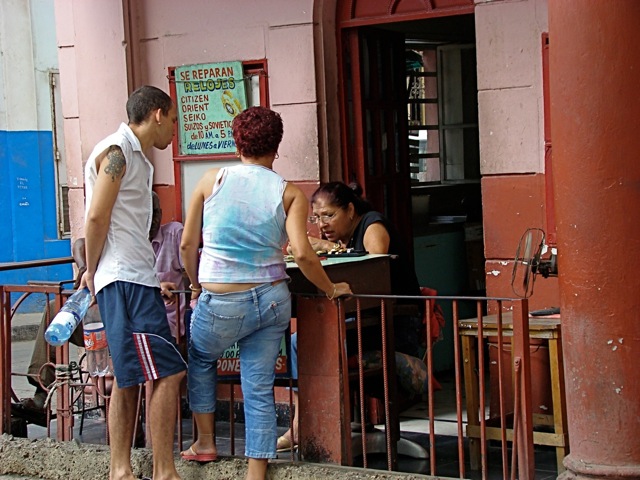
For weeks they were afraid they would appear on the list of layoffs on the wall, the list of names of those who — at that hospital — would be left without a job in the new reorganization of labor. The doctors, nurses and health care technicians put in more effort and avoided walking the halls during office hours so that their heads would not be included among those who would be laid off. The unusually high attendance and punctuality of those days surprised the manager, but even so they could not avoid the cuts. One afternoon in the dining hall a meeting was held to announce the list of the newly unemployed. Many of those present would not be returning in the morning, they’d been put out in the street as a consequence of the downsizing process that is causing so much anguish on this island.
As odd as it seems, the Cuban Workers Center (CTC), the only legal union in the country, has supported the reduction in payrolls. Instead of calling a general strike and confronting the government and its shock tactics, the CTC announced it would help raise awareness among its members about the need for layoffs. Meanwhile, State television is airing reports of high unemployment in Spain, the United States or Great Britain, while it is silent about the drama that one in four workers in Cuba will soon lose their livelihoods.
Instead of addressing the topic in a serious way, the news throws around triumphalist phrases about the “improvement” taking place in the manufacturing and service sector. Behind every slogan is a family whose meager wages are threatened, hundreds of thousands of people who have no preparation for making a living outside the State, the employer of 90 percent of all workers.
In theory, self-employment is supposed to absorb many of the newly unemployed, but the path to private enterprise is still strewn with obstacles and controls. Just 178 authorized professions are open to independent workers and very few are directly linked to production. Options include bizarre choices such as “button coverers for ready-made clothing,” but exclude more promising professions such as “auto-body repairer” or “ironworker.”
Those brave entrepreneurs who decide to try their hand at small business must pay license fees and taxes starting on day one, and follow strict restrictions on the origin of any resources used. For now they have no access to wholesale markets for raw materials while taking out a bank loan can take months, or years. For those hoping to go into food service, a health inspection is required and can take weeks, waiting for the nearest clinic to get around to sending someone. The entire network of support for private enterprise is fragile and dysfunctional. Thus, the newly self-employed need a strong dose of patience and significant capital to endure the initial stage before they turn a profit.
We should not discount, however, that despite these constraints the cumulative creativity and widespread practice of violating the law might serve these emerging entrepreneurs well in overcoming all obstacles. If this is coupled by growing demand for products and services there could be important dividends. But the lack of business experience and the long years under State paternalism cast doubt on the efficiency of and growth in successful self-employment.
To be pushed into making an independent living is almost like jumping in the void for those who have grown up in a country where, for decades, the State has been the monopoly employer. Fears race through each workplace when the publication of the dreaded list is announced. Not only do fears flourish, but so do opportunism and favoritism. The decision about which workers will stay and which will go is made by the director of each workplace, and we already know of cases where the most capable have not kept their jobs, rather it is those closest to the director. The places they try to conserve tend to be undervalued, and the loss of a quarter of the workers does not mean, for now, any increase in salary for those who remain.
So this afternoon, in a small hospital in a municipality of Havana, the employees know something more than a monthly salary or a place at a Public Clinic was going to be decided. It is also time to open their eyes to a different Cuba, where the promise of full-employment is no longer proclaimed to the four winds, and where working for yourself is a bleak and uncertain option. Some will exchange the white coat for a barber’s scissors, or an oven where they will bake pizza and bread. They will learn that economic independence inevitably brings political independence, they will fail or prosper, lie on their tax declarations or honestly report how much they have earned. In the end, they will embark on a new path, a difficult one, where Daddy State will not sustain them, but neither will he have the power to punish them.
A version of this article originally appeared in Peru’s El Comercio newspaper.
January 10, 2011
